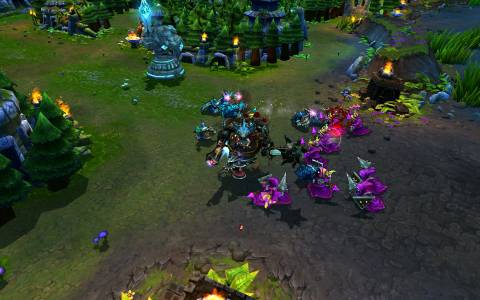
I’ve had a bunch of people asking me if I know anything about Eurogamer’s report this morning about PlayStation 4 developers allegedly not having access to as much of the machine’s RAM as Sony has previously indicated. The short version? No, I don’t.
The long version? I don’t care. The only specs I care about are the ones that determine whether or not I can run a game, and I have never been a person who finds it remotely interesting to get wound up about what is or isn’t inside of my game boxes. I’m always tickled when the technology press gets wound up over Apple’s decision to keep specs private, and nobody knows what’s really inside its devices until they arrive on the market. Cue the teardown from iFixit.com!
It’s not that specs aren’t important, but I can’t stand the conversation around them. People get wound up over what are, in the grand scheme of a potentially decade-long hardware cycle, meaningless differences. To what end? To spend pages spewing vomit at one another! How come we aren’t talking about how boring the launch lineups for both machines are looking? Because we’re become trained to expect garbage, and so we have nothing else to talk about?
Some PlayStation 4 games will look better than Xbox One games. Some Xbox One games will look better than PlayStation 4 games. Lots of PC games will look better than both. I realize it’s the summer and we’re all excited for the circus the fall is about to bring, but c’mon, get a grip!
I’d rather talk about trading cards on Steam. Ugh. Look what you made me say!
Hey, You Should Play This
Please enter your date of birth to view this video
By clicking 'enter', you agree to Giant Bomb's
Terms of Use and Privacy Policy
And You Should Read These, Too

I can’t claim to know much about eSports, and it’s becoming increasingly crazy for me to ignore what is a sector of gaming destined for continued growth. I need an angle, though, and so many of the games played in eSports don’t capture my attention. Learning that the US government has granted P-1 athlete visas to League of Legends players, though, is incredibly interesting. Known commentator (and lawyer!) David Phillip “UltraDavid” Graham has written an editorial about what fans should be considering as this potentially becomes more commonplace, and he pitches a potential future where legislation and regulation become a prominent part of gaming. Consider this a primer for a bigger conversation about the topic with Graham, hopefully early next week.
"Most current legislators, judges, and bureaucrats have little reason to think about people who play video games in tournaments. No American legislatures and few courts or government agencies have had to deal with the competitive aspects of video game play. But Riot’s work in securing P-1 visas for LoL players may signal the start of more direct government involvement, whether at the government’s own volition or at the continued behest of private parties."
- "On Why I Will Never Play The Castle Doctrine" by Cameron Kunzelman
- "Addressing some confusion" by Jason Rohrer

A firestorm erupted over Twitter earlier this week over comments by designer Jason Rohrer regarding his soon-to-be-released social experiment in MMO form, The Castle Doctrine. Players have a home, a small family, and a vault that starts with $2,000. You’re tasked with building a trap-filled home to prevent other players from killing your family and taking your money, and you must also go out and do the same. Killing the family is optional, but if the wife escapes the house, she leaves with half of the family’s money. As the title implies, The Castle Doctrine is more than just a social puzzle game, and it raises huge questions about whether playing ethically questionable material brands the player as ethically compromised, too. I don’t think that’s true, as I have plenty of problems with horror films I watch on a regular basis. That said, I don’t blame people for having trouble financially supporting people who create content they find objectionable, and Cameron Kunzelman makes a convincing argument, even if I disagree with it.
"Rohrer was “living in a place where [he] didn’t feel safe for the first time in life.” In this model, Rohrer’s safety and the safety of his family trumps the right to life of another human being. Any perceived threat to him or his family is met with a swift judgment on the offending party–he can kill the dog, he can kill the invader. Despite the fact that human beings are capable of speech and therefore can yell things like “get out of my house” or “fuck you” in order to force a would-be burglar to leave, for Rohrer, none of that matters."
If You Click It, It Will Play
Look, Crowdfunding Isn't Going Away (And FTL Was Pretty Good!)
- Odallus: The Dark Call is a modern game made in an 8-bit style and holy damn it looks good.
- You are a human piece of shit, Dan Rykert. I love you. Go fund his latest stupid thing, okay?
- Tangiers is a wholly unique kind of stealth game with some interesting potential.
Tweets That Make You Go "Hmmmmmm"
Finally read that article about how the biggest problem in fighting games accessibility is execution… a few years ago I would have agreed…
— Adam Atomic (@ADAMATOMIC) July 22, 2013
…But after playing online for like 100+ hours I can verify that execution is the easy part. The mind games are the real barrier to entry.
— Adam Atomic (@ADAMATOMIC) July 22, 2013
(within reasonable bounds of course - there are games/characters where execution eventually becomes a barrier)
— Adam Atomic (@ADAMATOMIC) July 22, 2013
memorizing canned combos, as hard as that is, is WAY easier than developing a philosophy and then implementing it and keeping your zen cool
— Adam Atomic (@ADAMATOMIC) July 22, 2013
The pages if a novel are like the bars of a cage: they allow us to see life's tigers and monsters up close, without danger.
— Simon Parkin (@SimonParkin) July 24, 2013
The same is true of video games. They allow us to assume the role of people who don't share our beliefs, values or systems of behaviour.
— Simon Parkin (@SimonParkin) July 24, 2013
In games we can play as the thief, the killer, the pervert or the plumber because we can distinguish what is play from what is earnest.
— Simon Parkin (@SimonParkin) July 24, 2013
Oh, And This Other Stuff
- The Economist takes a look at what happens to your data when you pass away.
- Edge makes the case that Portal 2’s co-op mode is the unsung hero of the game.
- Okay, Destructoid, you win this round.
- Gamasutra polls developers, discover they have mixed reactions to the first month of Ouya.
- My favorite part of a new Cara Ellison piece on Rock Paper Shotgun is reading the comments.
- Maybe assholes don’t have to be assholes?
- How Naughty Dog wrestled with ludonarrative dissonance by creating a sympathetic psychopath.
- I might enjoy reading about Animal Crossing: New Leaf more than I enjoy playing it.
- Tested explores the insane hoops people jump through for an authentic CRT experience.
- Leigh Alexander was a fan of Leisure Suit Larry, but can’t find much to like in the remake.
- For a few bucks, subscribe to The New Inquiry and check out its most recent (excellent) games issue.
- It’s hard for me to imagine the kinds of people who threaten lives over balance changes.
- If you want a little Ryan Davis on your website text, a solution has finally arrived.
- Vlambeer is one of gaming’s most talented set of unlucky video game developers.
- Some consideration of Rogue Legacy’s inclusion of a homosexuality trait that does...nothing.